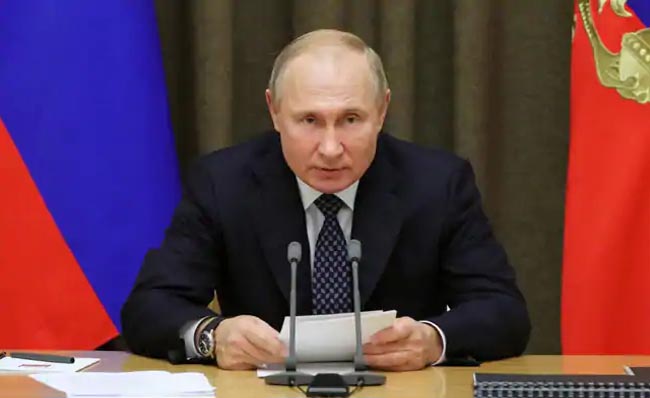Russia Develops World’s First Vaccine Against Corona virus
 MOSCOW: Russia on Tuesday declared itself the first country to approve a corona virus vaccine with President Vladimir Putin saying one of his daughters had been inoculated.
MOSCOW: Russia on Tuesday declared itself the first country to approve a corona virus vaccine with President Vladimir Putin saying one of his daughters had been inoculated.
Dubbing the vaccine “Sputnik V” after the Soviet-era satellite that was the first launched into space, Russian officials said it provided safe, stable immunity and denounced Western attempts to undermine Moscow’s research.
The vaccine has completed all trials and is deemed fit for use by the Russian authorities. Russia plans to launch the vaccine this week and vaccinate doctors as early as this month before launching a mass vaccination campaign later this year.
Scientists in the West have raised concerns about the speed of development of Russian vaccines, suggesting that researchers might be cutting corners and coming under pressure from authorities to deliver.
The World Health Organization said any WHO stamp of approval on a COVID-19 vaccine candidate would require a rigorous safety data review. “We are in close contact with the Russian health authorities and discussions are ongoing with respect to possible WHO pre-qualification of the vaccine,” said the UN agency’s spokesman Tarik Jasarevic in Geneva.
Putin had told a televised video conference call with government ministers, “This morning, for the first time in the world, a vaccine against the new corona virus was registered.
“I know that it is quite effective, that it gives sustainable immunity,” he said. The president said one of his daughters had been inoculated with the vaccine, developed by the Gamaleya research institute in coordination with the Russian defence ministry and other government bodies.
“In this sense she took part in the experiment,” Putin said, adding that she had a slight temperature after a second injection and “that’s all”. The chief of Russia’s sovereign wealth fund, which is financing and helping to coordinate the vaccine efforts, told reporters that Phase 3 trials on a large group of people would start on Wednesday.
President Putin said that Russia was emerging from the novel coronavirus epidemic with minimal losses, having handled it better than the United States where he said party political interests got in the way.
With 528,964 confirmed cases, Russia has the third-highest number of infections after Brazil and the United States. Its official death toll stands at 6,948, much lower than in many other countries, including the United States which has had over 115,000 deaths. The veracity of Russian statistics has sometimes been the focus of fierce debate however.
Kirill Dmitriyev, who heads the Russian Direct Investment Fund (RDIF), said industrial production was expected from September and that 20 countries had made “preliminary applications for over one billion doses” of the vaccine.
He said that along with foreign partners Russia was ready to manufacture 500 million doses of vaccine per year in five countries. Dmitriyev denounced “coordinated and carefully orchestrated media attacks” designed to “discredit” Russia’s vaccine.
Russia has been pushing hard to quickly develop a corona virus vaccine and said earlier this month it hoped to launch mass production within weeks and turn out “several million” doses per month by next year.
WHO Spokesman Christian Lindmeier told reporters at the time that the WHO had not been officially notified of any Russian vaccine on the verge of being deployed.
Experts said they were concerned that not enough was known about Russia’s research.”There seems to be rather little detail thus far on Russian (vaccine) candidates,” said Danny Altmann, a professor of Immunology at Imperial College London.
“The collateral damage from release of any vaccine that was less than safe and effective could exacerbate our current problems insurmountably.” The vaccine developed by Russia is a so-called viral vector vaccine, meaning it employs another virus to carry the DNA encoding of the needed immune response into cells.
Moscow has dismissed allegations from Britain, the United States and Canada that a hacking group linked to Russian intelligence services tried to steal information about a coronavirus vaccine from labs in the West.
This statement by Gintsburg was condemned by the Russian Association of Clinical Research Association (RACRA), which stated that it was a “crude violation of the very foundations of clinical research, Russian law and universally accepted international regulations.”
The World Health Organisation (WHO) may have dampened the spirits on Monday when it said there might never be a “silver bullet” for Covid-19, Agence France-Presse reported. WHO further stressed on following the known basics, which include testing, contact tracing, social distancing, and sporting a mask.
Addressing a virtual press conference, WHO Director-General Tedros Adhanom Ghebreyesus, said: “A number of vaccines are now in phase-III clinical trials. We all hope to have a number of effective vaccines that can help prevent people from infection.”
“However, there’s no silver bullet at the moment — and there might never be. For now, stopping outbreaks comes down to the basics of public health and disease control. Do it all,” he urged.
(With Agency Inputs ).

